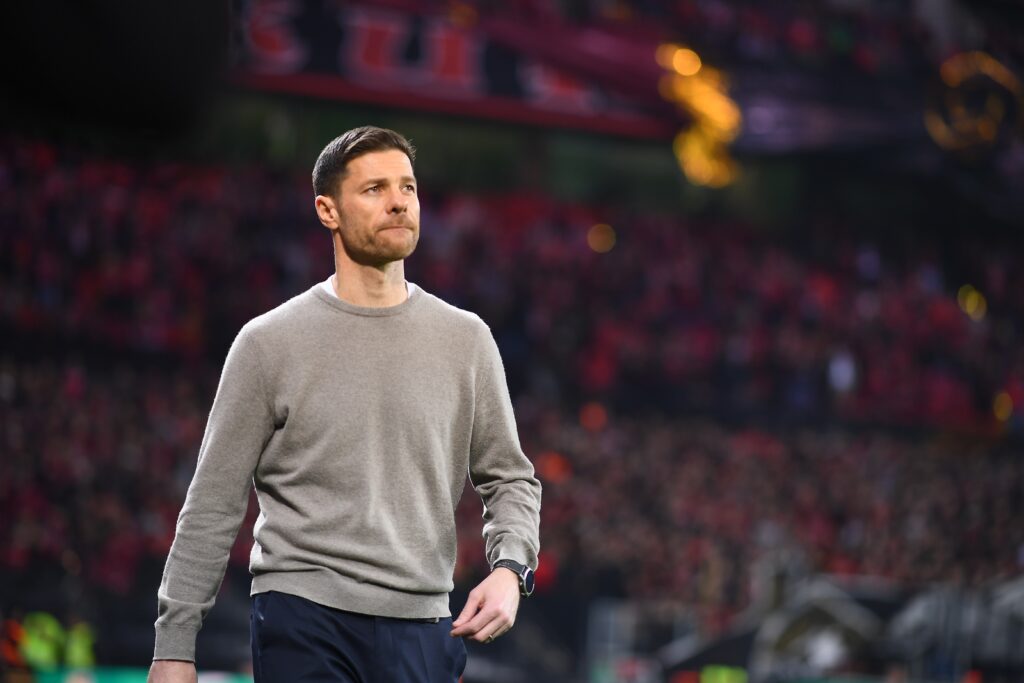In one of football’s most anticipated transitions, Xabi Alonso will take over as Real Madrid’s head coach at the conclusion of the current season. The announcement, which comes after Carlo Ancelotti confirmed his departure, signals the end of the Italian’s successful second stint at the helm of the Spanish giants. Ancelotti, who is set to take charge of Brazil’s national team, passes on the reins to Alonso, once a Madrid legend in the midfield. This shift marks not only the end of an era but also the dawn of a new chapter for the club.
Real Madrid’s Next Chapter: A Rising Star Takes Charge
Alonso’s appointment as Real Madrid head coach is the culmination of years of preparation. After taking Bayer Leverkusen to a historic Bundesliga title and winning the German Cup, Alonso has emerged as one of the most promising young coaches in European football. His tactical prowess and emotional intelligence have earned him widespread recognition, but now, at one of the world’s most high-pressure football clubs, Alonso faces a challenge unlike any before.
Alonso will inherit a squad filled with talent but also in the midst of a transition. The team features global superstars like Kylian Mbappé and Vinicius Jr., two players who, despite their undeniable abilities, have at times shown friction in their roles within the squad. Alonso must manage not only the egos of his star players but also integrate promising young talents such as Endrick and Arda Güler, all while phasing out older players who have been pivotal to the club’s recent successes.
Pressure to Win: No Room for Error
Real Madrid has set high expectations for Alonso, and there will be no grace period. The club’s history demands immediate success. With the spotlight squarely on him, Alonso will be expected to bring home silverware, starting with La Liga, the Champions League, or both. This is no easy task, as Real’s recent performance has been mixed, with questions around player discipline and the team’s tactical consistency under Ancelotti.
Alonso will need to balance the needs of the current squad with long-term goals, as expectations from fans and the media remain sky-high. Madrid’s media landscape, known for its relentless scrutiny, will offer little room for missteps. Alonso’s challenge will be to navigate the politics of the club, as he attempts to reinvigorate the team while maintaining harmony within the dressing room.
The End of the Ancelotti Era: A Legacy of Calm Leadership
Carlo Ancelotti’s tenure at Real Madrid will be remembered for its remarkable success, including victories in La Liga, the Champions League, and the FIFA Club World Cup. However, the final season of his second spell at the club ended in complexity. Despite winning multiple trophies in his first term and again in his second, Ancelotti’s relationship with the squad and management began to show signs of strain.
Internal tensions, particularly with key players like Mbappé and Vinicius, began to erode the once-solid cohesion within the team. Reports of internal disagreements over training intensity and squad management highlighted the fractures within the dressing room. While Ancelotti remained composed in public, privately, tensions were growing, with the board questioning his ability to continue managing the team at the highest level.
Ancelotti’s Final Season: Trophyless and Tense
While Ancelotti’s initial success with Madrid—marked by a La Liga and Champions League double—cemented his place in the club’s history, this season’s potential trophyless finish was a bitter disappointment. It provided the backdrop for President Florentino Pérez’s decision to make a change. Ancelotti’s cautious approach in dealing with the club’s younger players, like Güler and Endrick, was a source of contention. Additionally, despite having one of the world’s best squads, Madrid’s performance on the field failed to meet expectations.
Ancelotti’s handling of the team was often seen as pragmatic, but it eventually led to a sense of stagnation. His methods, once celebrated for restoring order and discipline, began to feel outdated in a club like Real Madrid, where brilliance is expected year in and year out. As a result, Ancelotti will now take over Brazil’s national team, leaving behind a legacy of calm leadership and significant accomplishments.
Tensions Behind the Scenes: Ancelotti’s Relationship with the Club
Ancelotti’s relationship with the Real Madrid board became increasingly strained as the season wore on. Key decisions, such as the rejection of his request for defensive reinforcements in January, reflected a growing disconnect between the coach and club leadership. While Ancelotti remained publicly loyal, his private frustrations were evident, particularly regarding the lack of support in crucial areas.
This growing divide led to discussions about his future with the club, which ultimately reached a tipping point. By October, the board had already begun planning for a future without him, and Alonso’s emergence as the ideal successor was the result of these internal deliberations.
The Alonso Era Dawns
As Ancelotti heads towards Brazil, Real Madrid prepares for the start of the Alonso era. The transition, though marked by some internal tensions, offers a fresh start for both the club and the coach. Alonso’s tactical innovation and emotional intelligence will be key in navigating the challenges ahead. However, the pressure to succeed immediately remains, and Madrid’s relentless expectations will leave little room for error.
For Alonso, this is the opportunity of a lifetime, one that promises to define his career. He will have to prove that his success in Germany was no fluke and that he can manage the immense weight of Real Madrid’s legacy. With a squad full of talent and high expectations, Alonso’s challenge will be to unite the team, win titles, and secure his place as one of the great managers in football history.
As for Ancelotti, his departure marks the end of an era. Yet, his legacy at Madrid will remain intact, celebrated for bringing calm leadership, tactical intelligence, and numerous trophies to the Bernabéu.


